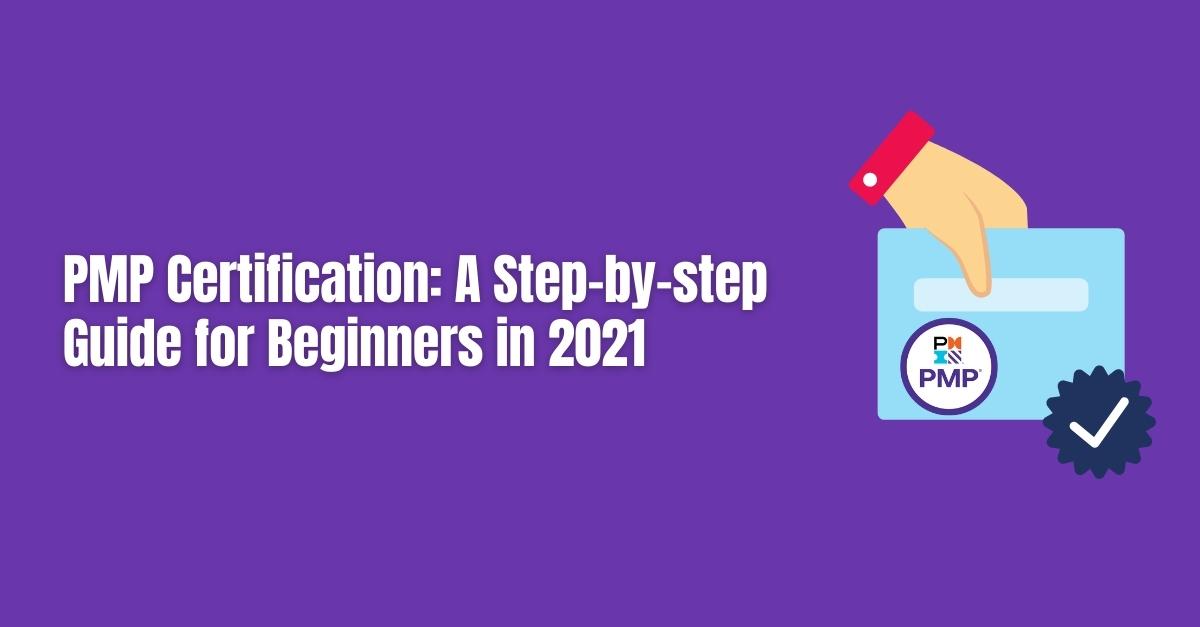PMP Certification: A Step-by-step Guide for Beginners in 2021
Do you want to set yourself apart in the global pool of project managers and have an edge over the competition in the job market? The rapidly growing number of PMP-certified professionals attests to the increasing popularity and demand for PMP professionals in the world. The global recognition that comes with it opens a myriad of career opportunities for professionals.
If you have made up your mind to join the community of Project Management Professionals (PMP) and are wondering where to start, here is a step-by-step guide.
How Can PMP Certification Help Your Career?
What is PMP certification? Why do project managers all over the globe vie for the same certification? Often praised as the gold standard in project management, PMP certification is the perfect union of all the quintessential project management skills. It is authorized by PMI (Project Management Institute) and can distinguish you in your industry with having exceptional problem-solving and leadership skills.
PMP professionals can lead projects anywhere in the world; unlike other professional certifications, PMP does not focus on a certain niche, profession, or industry. While adding value to an organization comes easy to a PMP professional, there is more to the certification that makes it a globally desirable credential.
Here is why PMP certification is important for your career:
1. PMP Certification Rapidly Increases Your Credibility
More often than not, organizations that hunt for project managers use PMP as a criterion to filter their candidate pool. You can always count on your PMP certification to give you an upper hand over other non-certified professionals in the labor market. It shouts out your refined skill set and your hands-on experience with managing complex projects. Planning, monitoring, guiding, and executing a project demands great discipline and experience; project managers are expected to take the entire accountability of the project. PMP certification prepares a professional for just that.
2. PMP Professionals Have Great Earning Potential
According to a survey conducted by PMI, certified PMP professionals earn 20 percent more than non-certified project managers. Of the 32,000 project managers who were surveyed, 72 percent of them reported having had a hike in their annual salary, including bonuses and other compensations over a period of 12 months before the survey. The median salary of certified PMP professionals in the US is $81,000, while the median salary of non-certified project managers is $91,000.
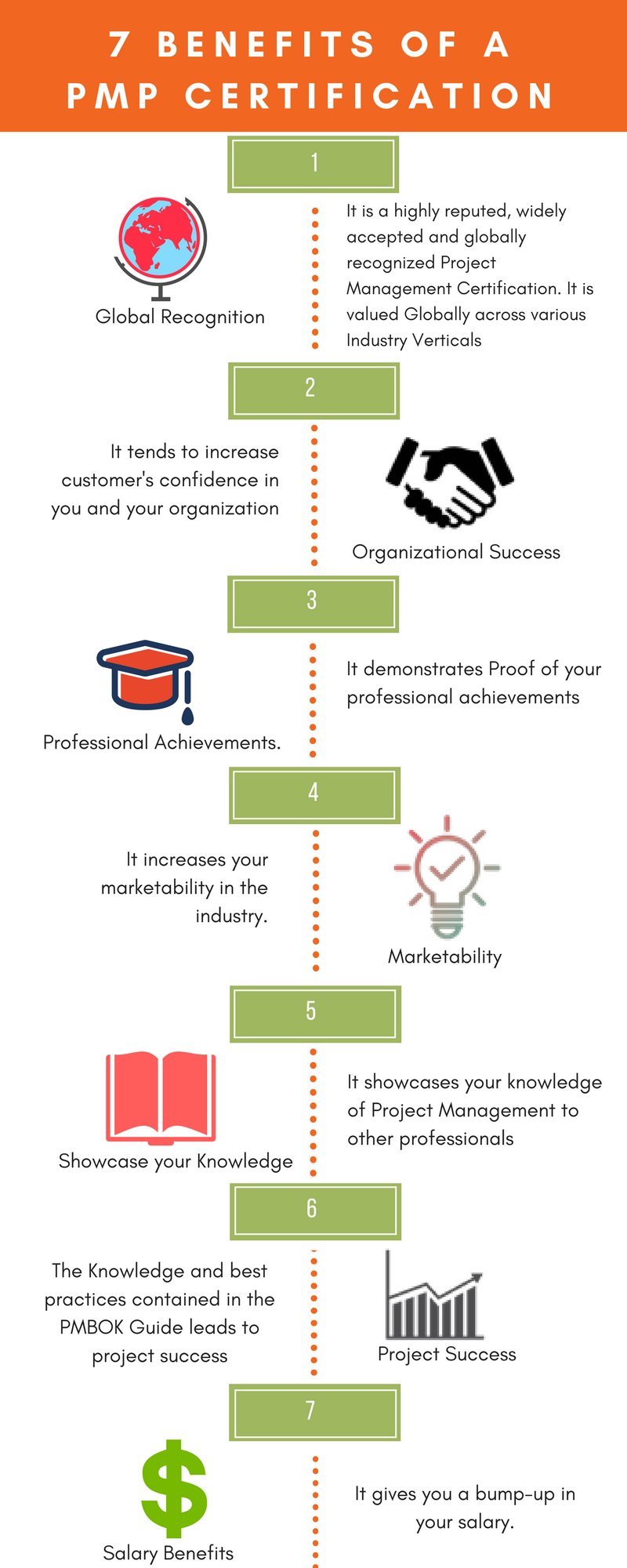
Source: Pinterest
3. PMP Certification Enhances Your Skills
It is imperative for a candidate to learn all aspects of project management before getting certified, including initiation, implementation, monitoring, controlling, and closing. PMP training sessions are designed to expose candidates to the aspects of a project that they otherwise would not have had hands-on experience with.
PMP certification helps you master the global standard language of project management. Candidates are coached to better align themselves with project goals, foresee hazards, and tackle risks with grace.
4. PMP Certification Boosts Your Marketability
It has been proven time and again that PMP certification can take your career to the next level. According to recent studies, some recruiters tend to divide their candidate pool into two: those with and those without PMP certification. Some organizations even prefer PMP candidates over individuals with Master’s degrees. Industries such as aerospace, pharmaceuticals, and finance have a strong preference for PMP-certified professionals since these roles require strict adherence to defined processes for the completion of sensitive projects.
5. PMP Certification Helps You Keep up with Industry Trends
Project managers, irrespective of their industry, are expected to update themselves with the latest project management trends and continually aspire to become their best selves. The field of project management undergoes changes every year, in terms of tools, techniques, practices, and technologies. Be it the integration of hybrid project management practices or the increased use of Artificial Intelligence and data analytics, managers need to have a horizontal knowledge of trends.
PMI is a very competent authority that rigorously follows and updates itself with rapidly changing trends in industries. The content of the course is amended based on the trends and demands so that a PMP-certified professional will have all the in-demand skills they need.
6. PMP Certification Helps You Maintain Influential Relationships
PMI certification training sessions put you in an environment full of people with similar aspirations and objectives. Professional networking is undisputedly one of the most influential ways to better your career prospects. Building and maintaining good relationships with other PMP professionals will help you open doors and increase your access to opportunities.
PMI holds meetings for PMP practitioners to learn more about project management. There are also dedicated slots for PMP professionals to discuss job openings in their own organizations, thus helping them connect their peers with the right opportunities. There is also an array of online and offline forums for PMP professionals where they can connect and explore opportunities.
PMP Certification Exam: The 5 Ws
The PMP certification exam is necessary for every project manager who wants to climb the project management ladder. Not only does the exam help you increase your visibility in the labor market, it equips you with all the skills you need to achieve the pre-defined objectives of your projects.
Here are the 5 Ws of the PMP exam:
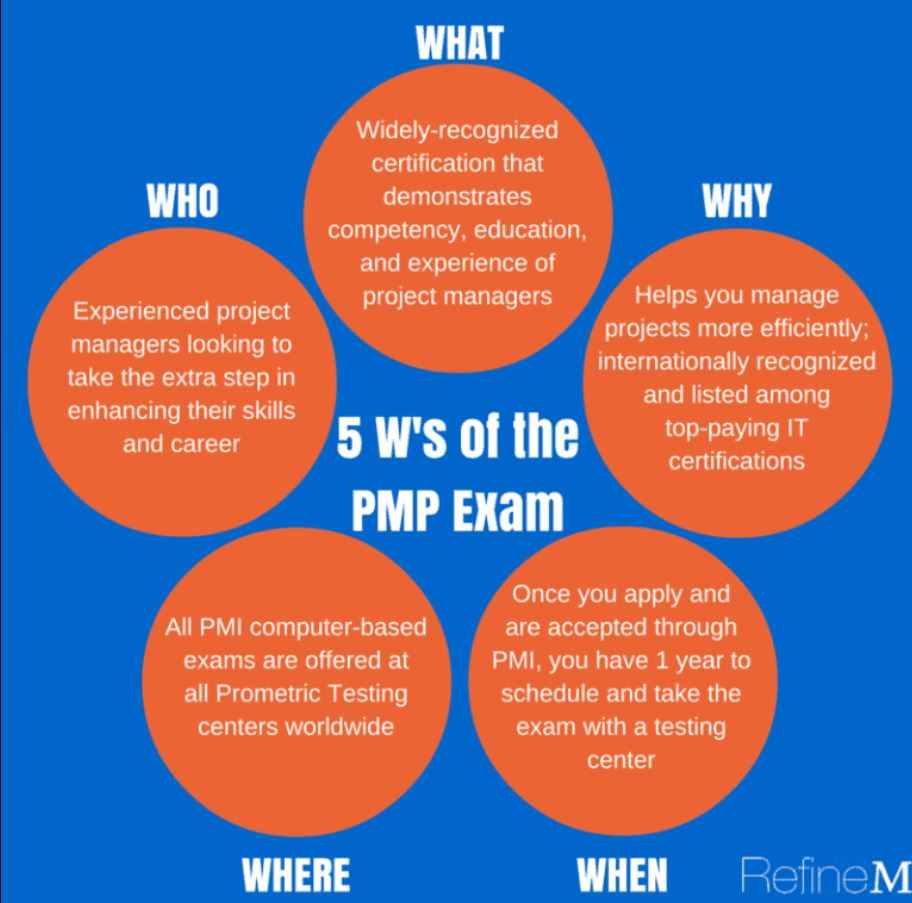
Source: RefineM
- Who – The PMP exam is for project managers who are growth-oriented.
- What – It is an unprejudiced validation of a professional’s project management skills.
- Why – It is recognized all over the globe and gives you an upper hand in the market.
- Where – The exams are conducted at Prometric testing centers.
- When – After PMI verifies your application, you have one year to schedule and complete the exam.
Recent Updates to the PMP Exam
Due to the pandemic, PMI has made some crucial amendments to the modules, question patterns, and training.
Here are some of the key changes that aspiring candidates should take note of:
- Exam Pattern
The new PMP exam pattern went into effect on January 02, 2021 and will focus on the domains of Process, Business Environment, and People.
Here is the weight of each domain:
Process – 50 percent
People – 42 percent
Business Environment – 8 percent

Source: IIL Blog
- Questions
While the old PMP exam had 200 multiple choice questions, the new exam has 180, of which 50 percent will be from Hybrid and Agile methodologies.
- ATP Program
PMI has mandated that an instructor qualifies for the TTT (train-the-trainer) program to become a PMP instructor. It has also announced itself as the only provider of the self-paced learning program which is priced at $669.
- Application and Exam
The application procedures for the PMP exam have been simplified by PMI. It now allows candidates to take online proctored exams; you can now appear for your PMP exam from the comfort of your own home.
PMP Certification Exam: Key Areas and Different Question Formats
The syllabus of the PMP certification exam is divided across the important domains of project management. The questions pertaining to each of these domains will be used to test how good your understanding is.
The PMP certification exam will focus on the following domains:
1. People – This domain emphasizes the various skills a project manager needs to effectively lead a project team.
2. Process – This domain deals with the technical side of project management.
3. Business Environment – The business environment focuses on the relationship between organization strategy and projects.
The PMP exam, like most professional exams, is lengthy. It contains 180 questions that are divided across different stages and aspects of project management. The questions are a combination of multiple-choice, matching, multiple responses, hotspot, and fill-in-the-blanks.
The questions of a PMP certification test can be in 1 of 5 formats:
1. Situational PMP Questions
Situational questions are crafted to test your ability to put your theoretical knowledge to practice in real-life situations. The questions are often long and might have information that could be both useful and useless. You need to use your judgment skills to understand what works in a project management environment and what does not.
The trick is to read the question well, filter out parts that are of no use, and identify the relevant information in the question that you can leverage. Since a question will not represent the entirety of a real-life situation, try not to fixate on too many what if… and what about… considerations.
2. Knowledge-based PMP Questions
Knowledge-based PMP exam questions are based on various project management concepts. This could involve your general knowledge in project management, different skills, various project management process groups, inputs, outputs, techniques, tools, and so on. A thorough understanding of the PMBOK (Project Management Body of Knowledge) guide will help you answer the majority of these questions. However, knowledge-based questions can also be indirect.
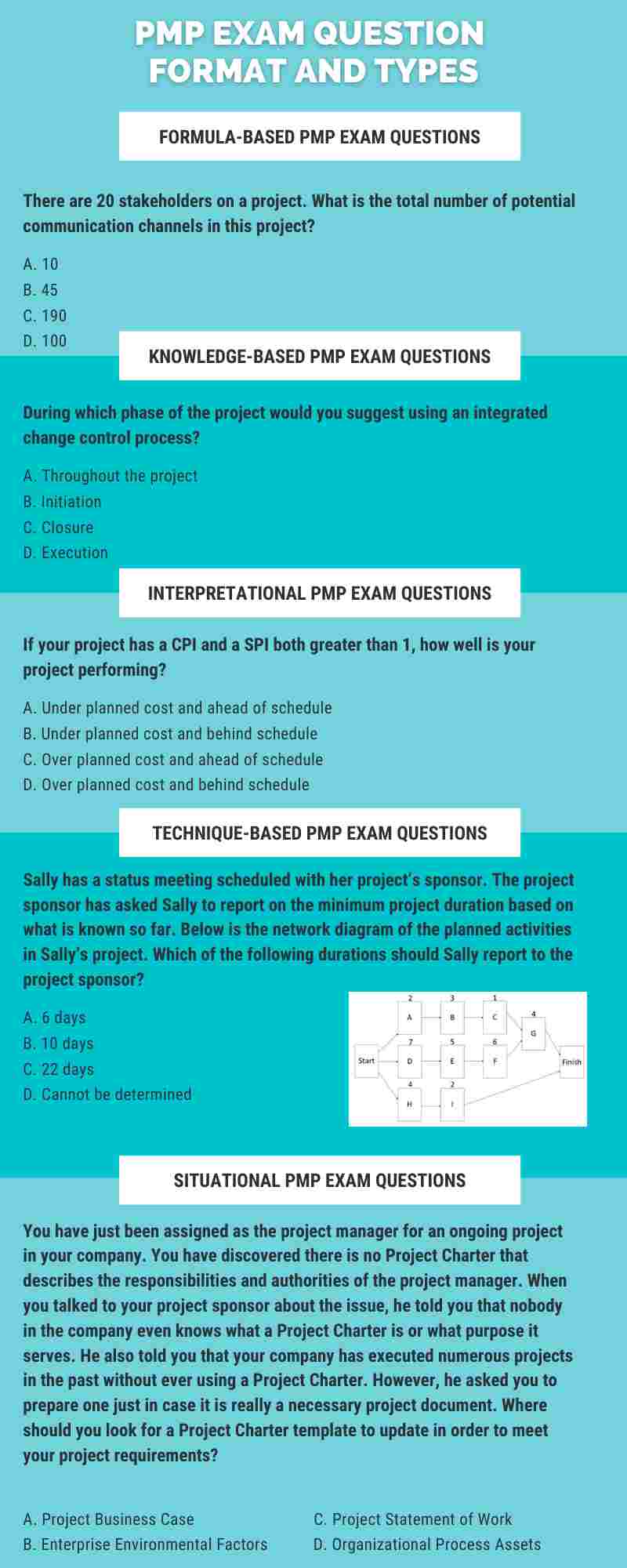
3. Interpretational PMP Questions
Interpretational questions are integral to measuring the candidate’s ability to deduce a condition or situation from the description provided in the question. A PMP aspirant is strongly recommended to engage in critical-thinking skills while referring to the PMBOK Guide to comprehend and deduce various real-life project management problems. You must be skilled enough to interpret the question and identify from a graph or given metrics whether the situation is good, bad, or neutral.
4. Formula-based PMP Questions
Formula-based questions demand you to make critical decisions regarding which information or figure in the question you should involve in your calculation. A good understanding of all of the forty-four PMP formulas will help you eliminate the wrong choice. The ideal way to learn all the formulas is to practice them. A fair understanding of all the forty-four formulas, twenty values, and thirty formula-related acronyms will help you make quick decisions while attempting to answer the questions.
5. Technique-based PMP Questions
The PMBOK Guide lists a PMP exam technique for every project management process. The guide defines a technique as “a defined systematic procedure employed by a human resource to perform an activity to produce a product or result or deliver a service, and that may employ one or more tools.” You will most likely have to face a question that tests your understanding of various techniques. It could either be knowledge-based, where the question examines your understanding of the technique, or it could be to ask you to demonstrate how and where the technique is applied.
What Makes You Eligible for PMP Certification?
Are you wondering why PMP is firm with its eligibility criteria? Project delivery will fail if a project manager cannot effectively plan the scope of work or define its objectives. An efficient project manager has good theoretical, as well as practical, knowledge and must be proficient in using all of the project management techniques. This demands solid experience and qualification.
The following are the prerequisites for the PMP certification exam:
If you are a four-year degree holder, you need:
- 35 contact hours of formal PMP certification training
- 36 months (minimum) of experience in project management
- 4500 hours (minimum) of experience in leading projects as a project manager

If you do not have a four-year degree, you need:
- 35 contact hours of formal PMP certification training
- 60 months (minimum) of experience in project management
- 7500 hours (minimum) of experience in leading projects as a project manager
How to Earn Your 35 Contact Hours Certificate?
One contact hour is equal to one hour of PMP certification training. You can clock these hours with both online and offline PMP training. The number of your contact hours can be a sum total of all the formal training you have undergone for your certification. That is, you do not necessarily have to take one course that counts for all 35 hours.
Make sure you have experience in the following:
- Project procurement
- Project scope
- Schedule
- Project quality
- Budget
- Communications
- Risk
- Project integration management
PMI does not acknowledge self-learning as credible formal training. While your self-learning hours can certainly contribute to your understanding of various project management techniques, formal education in project management is necessary to apply for the exam.
Where to get a formal education in project management? You can get formally trained in all aspects of project management from training consultants, university or college education programs, Registered Education Providers (REPs), programs sponsored by your organization, and so on.
What Is the Cost of PMP Certification?
The cost of getting PMP-certified could vary from country to country. A quality PMP certification experience will cost you somewhere around $3000 to $5000. The cost will also vary depending on whether you are a PMI member or not. If you want to be a PMI member right before the exam, you will have to spend $555, which will cover your exam fee as well as your membership fee.
Here is a breakdown of the cost you have to shell out during each stage of PMP certification:
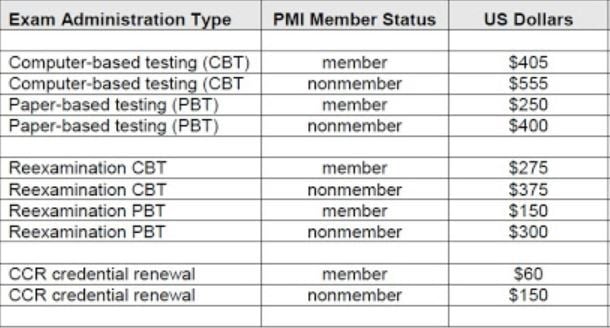
Source: Amazonaws
Computer-based Testing (CBT)
- For PMI members: $405
- For non-PMI members: $555
Paper-based Testing
- For PMI members: $250
- For non-PMI members: $400
Re-examination
- For PMI members: $275
- For non-PMI members: $375
PMI membership renewal fee
- PMI member: $60
- Non-PMI member: $150
How to Apply for PMP Certification?
Follow these steps to successfully apply for your PMP certification:
1. Register at pmi.org, and create your personal profile.
2. Get formal education in PMP certification, and earn 35 contact hours.
3. Apply for PMI membership for discounts, including updated study materials such as foundation standards, and the PMBOK guide.
4. Submit your online application within 90 days.
5. PMI reviews and accepts applications within 5 to 6 days, after which you can pay your fee.
6. Schedule your exam.
Tips to Prepare for PMP Certification Exam
The PMP certification exam is without a doubt one of the toughest professional competitive exams. You need thorough preparation and extensive training over the course of months to crack your certification exam in one go.
Here are some tips to crack your PMP certification exam in one go:
1. Use the PMBOK Guide Effectively
Since the exam is largely based on the PMBOK guide, it is essentially your roadmap while preparing for your exam. Start your preparation with the guide and later move on to other study materials, set daily and weekly goals, and try to cover a management process every day. Make sure you engage in critical thinking while referring to the PMBOK guide; PMP exam questions will test your ability to practically apply these concepts in various real-life situations.
2. Make Sure You Use a Good PMP Prep Book
Using good preparation material is necessary to grasp various project management concepts and get your basics right. PMP authors like Rita Mulcahy and Andy Crowe have written very comprehensive prep books for PMP aspirants. A good PMP prep book makes sure your learning curve is smooth, it takes you through the ins and outs of project management processes and techniques.
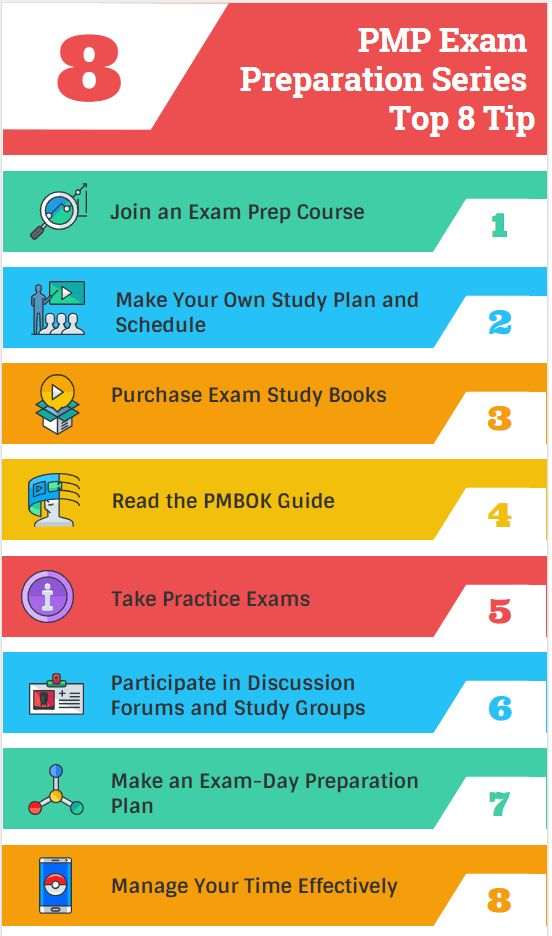
Source: ProjectCubicle
3. Sign up for Exam Prep Workshops
PMP exam prep workshops are a great way to get guidance from industry experts and to meet other PMP aspirants. Such workshops are also one of the easiest ways for you to earn your 35 contact hour requirement. Online prep workshops are more reasonable than traditional prep classes; most of these workshops offer simulated tests to help you get acclimated to exam pressure and time management.
4. Try Online Simulated Exams
Aside from helping you gauge your PMP certification preparation, simulated exams can help you get used to the exam environment and question patterns. They also contribute to the retention of information and equip you to manage your time better.
5. Be a Part of Discussion Forums and Study Groups
There are numerous online discussion forums and study groups that you can be an active member of. Not only can you seek answers to your questions and queries, you can also uplift other members of your community by helping them address their concerns. You can get access to good reference materials, discuss your roadblocks, and even come across tips to reduce your preparation time.
6. Do Not Forget to Use Flashcards
Creating flashcards is a tried and tested method for easy PMP preparation. They are affordable and portable; the downloadable flashcards can be easily flipped through on a computer or smartphone.
Best Learning Materials for the PMP Exam
While PMP certification training programs make the best option to get a quality hands-on learning experience, never underestimate the significance of self-learning.
Here is a list of good PMP prep materials aside from the PMBOK Guide:
1. PMP Project Management Professional Exam Study Guide
Authored by Kim Heldman, this is a fully updated study guide for PMP aspirants. The book is not only a prep guide, it also serves as on-the-job reference material for project managers. You can find in-depth coverage of basic concepts, processes, and techniques in this guide.
2. PMP® Exam Prep - 200+ Practice Questions and Study Tips
Written by Brian Hanratty, this PMP certification study guide aligns with the Sixth Edition of the PMBOK Guide. It is a global bestseller with over 200 practice questions, preparation tips, exam tips, and so on.
3. PMP Exam Prep - How to Pass on Your First Attempt
Rita Gladwell’s PMP Exam Prep is a powerful PMP study guide to help you crack your PMP certification exam in one go. It covers the latest principles in the PMBOK Guide and introduces you to the updated certification objectives. It has been crafted to ensure faster learning and better retention of information.
4. PMP PMBOK Study Guide! Project Management Professional Study Guide!
If your busy life will not let you squeeze in the time to read, this PMP exam study guide has you covered. Authored by Ralph Cybulski, this is an audio guide that provides an overview of the important concepts, processes, responsibilities of a project manager, and so on.
If you aspire to crack your exam in one go, it is imperative to sign up for a quality training course. Not only can a training course help you stay motivated, but it can also give you insights from an industry expert, which will eventually be of greater value than your takeaway from a self-paced learning experience. GreyCampus offers instructor-led PMP certification training. The program offers 6 months of unlimited access to live bootcamps, a simulated test, a 35 contact hours certificate, and access to official PMI content.
